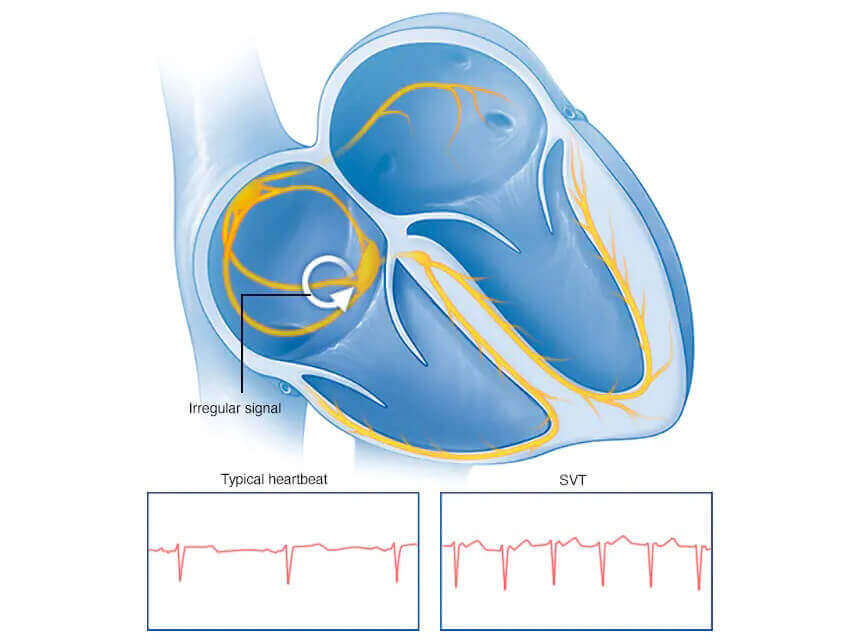Supraventricular Tachycardia Treatment In Hyderabad
#Top Cardiologist in Hyderabad

Supraventricular Tachycardia refers to a group of heart conditions that involve irregularly fast or erratic heart beat. Supraventricular literally means above the ventricles or the lower chambers of the heart. Tachycardia refers to rapid heart rate.
In a healthy individual, the heart beat about 60 to 100 times a minute. When the rate goes above 100 beats a minute, it is known as tachycardia. In case of an SVT, the heart rate can go upto a range of 150 to 220 beats per minute.
In most cases, no treatment is necessary. In others, simple lifestyle changes & medications may suffice. In still others, certain heart procedures may be necessary.
What are the types of SVT?
There are 3 types of suprventricular tachycardia:
Atrioventricular Nodal Reentrant Tachycardia: This is the most common form of SVT.
Atrioventricular Reciprocating Tachycardia: This is most often seen in younger individuals.
Atrial Tachycardia: This is often diagnosed in individuals with heart disease.
Are there any signs & symptoms?
While some people with SVT do not experience any symptoms, others may experience the following:
Rapid heartbeat
Fatigue
Palpitations
Pain in the chest
A pounding sensation in the neck
Breathlessness
Dizziness & sweating
Fainting
In infants & very young children, symptoms may be hard to identify. These include:
Sweating
Pale skin
Rapid heartbeat
Poor feeding
What causes SVT?
For most people, stress, exercise or lack of sleep can result in an SVT episode. For others, the triggers may include:
Excess caffeine or alcohol
Drug abuse
Smoking
Pregnancy
Medical Conditions like heart disease, heart failure, chronic lung disease, thyroid disorders.
Medications for asthma, cold & allergies
Other factors that may increase one’s risk of developing this disease are:
Older age
History of heart disease or heart surgery
Congenital heart disease
Obstructive sleep apnea
Diabetes
Can it be prevented?
To prevent an SVT episode, you need to identify the triggers & avoid them. Further, eat a heart healthy diet, avoid alcohol & smoking, exercise regularly & manage stress effectively.
How is it diagnosed?
Your cardiologist may enquire about your medical history & symptoms to diagnose your condition. You may also be recommended the following tests:
Blood tests: To check for conditions which have similar symptoms.
ECG: To measure the electrical activity & see how fast or slow the heart is beating.
Holter Monitor: This helps records heart activity during your daily activities.
Event recorder: This is a wearable device that measures any infrequent arrhythmias.
Echocardiogram: It helps get details about heart & heart valves.
Implantable loop recorder: This device helps detect irregular heart rhythms
Tilt Table Test: This is recommenced when a patient has had fainting spells. It is used to monitor heart rate & blood pressure when you lie flat on a table.
Exercise Stress Test: This helps monitor heart activity when you exercise on a treadmill.
Can it be treated?
Most patients with SVT do not need any treatment. However, in case of longstanding or persistent episodes, your cardiologist may recommend:
Medications: To control heart rate or restore heart rhythm.
Vagal Manoeuvres: Specific actions like coughing or putting an ice pack on the face affect the vagus nerve & can help slow down heart rate.
Carotid sinus massage: This involves applying genie pressure on the neck where the carotid artery splits into two branches.
Cardioversion: This is often used when medications & vagal manoeuvres fail.
Pacemaker: In rare cases, implantable device may be needed to stimulate the heart to beat.
Dr Sudheer Koganti is the best cardiologist in Hyderabad & offers the best treatment for SVT.


